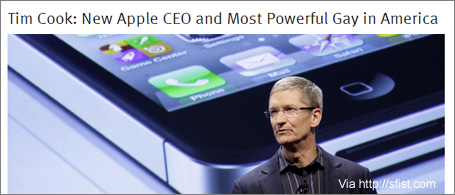Tim Cook’s ascension to the position of Apple CEO has raised considerable media interest, most notably in relation to his purported sexual orientation. Many have dubbed him ‘the most powerful gay man in the world.’ While a rather grand claim to make, critics have suggested that media obsession with his sexual orientation, has erased reporting on the personal merit related to his success.
While this debate has varied historical and political dimensions, for the purposes of illustration, it is useful to summarise some of the competing views. On one hand, some argue that sexual orientation is an emotional or intimate attachment that should be entitled to privacy. At the same time, others argue that in a culture that assumes the heterosexuality of all people, if there are no ‘out’ powerful gay people, a failure to report diverse sexualities reinforces the idea that being queer and successful are not simultaneously possible.
Rather than subscribe to either view, perhaps our focus should be less on the sexual orientation of the individual in question, and more on the way we discuss sexuality (or other social differences) in the public space. Specifically, we must avoid causally connecting sexual orientation with success or failure. Instead, we must be clear to distinguish between the political connotations of a person’s sexuality and the personal relevance it has for the individual in question.
Putting debates on sexuality to one side, the association between wealth and corporate achievement raises broader questions on how we measure personal triumph and success.
So the question is – what indexes do we use to measure ‘power’ and ‘success’ in public life?
We only need to look at the impetus behind the international ‘It Gets Better’ campaign, pioneered by advice columnist Dan Savage, to understand the way ‘gay’ success is constructed.
In response to the spate of suicides by young people prompted by homophobia or transphobia, the campaign was launched with the aim of highlighting the enduring power of lesbian, gay, bisexual, transgender and intersex people across the world, despite disadvantage and discrimination.
While it’s a commendable campaign initiative, as US-based academic Jasbir Puar points out, part of the campaign relies on homogenising what it means to be gay. Reinforcing an aspirational neo-liberal, white, middle-class image of a ‘better future’ does not necessarily connect with a diverse range of young people. In particular, Puar notes that ‘better’ is indexed in terms of ‘coming out’ and transforming social injury into economic triumph. In doing so, these representations produce a very parochial narrative of what ‘gay’ success is. While this critique in no way erases the importance of such a political project, it does signal the need for greater diversity and discussion of difference in our narratives of the future.
So how does this relate to reporting on the sexuality and power of a CEO? Essentially, we must take care to avoid reproducing stereotypes of success and sexuality that limit it to corporate enterprise or consumer agency. Praise should be contingent on merit and personal circumstances – not homogenised in relation to one aspect of identity or another.
Tim Cook’s success or failure as a CEO is not confined to his romantic attachments or sexual practices. At the same time, however, we must recognise how his public persona signals the idea (among many others) that heterosexuality is not the only way of life that enables successful living.
That said, in making these representations, we must be cautious to avoid reinforcing the normative idea that economic entrepreneurialism is only what counts as success.
Ultimately, what this discussion highlights is the need to ask much broader questions about the representation of sexuality in the media. In particular, we must be attentive to the way these media representations a/effect public debate and subsequently shape our dynamic projects for social change.
Senthorun Raj is the Senior Policy Advisor for the Gay and Lesbian Rights Lobby in New South Wales, Australia.

